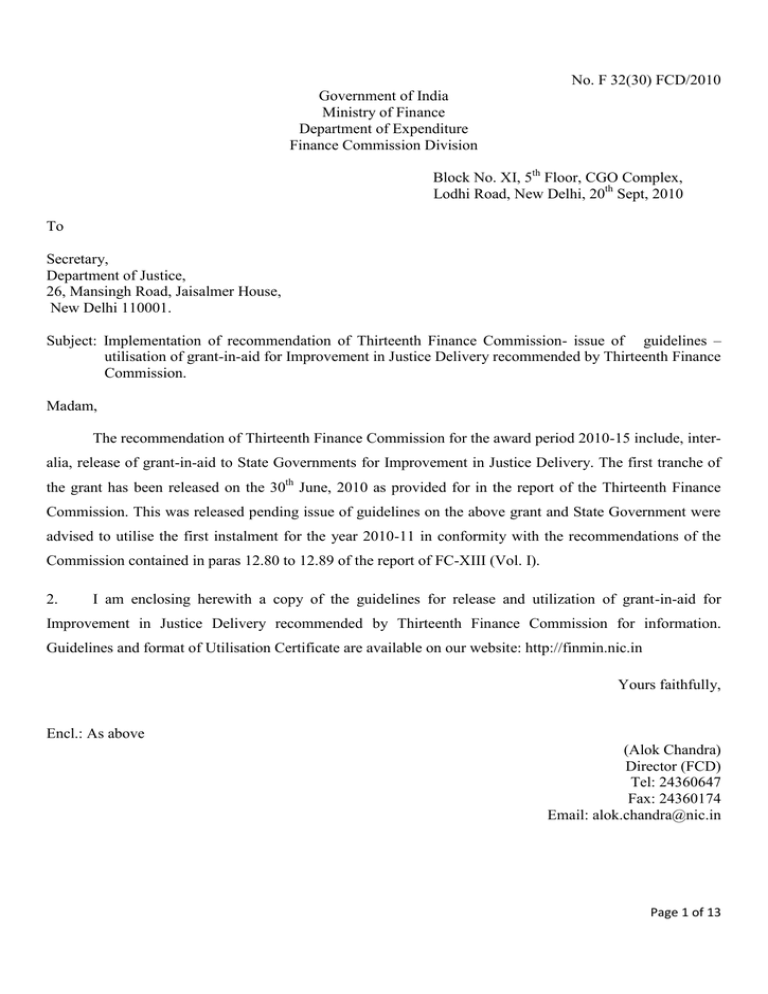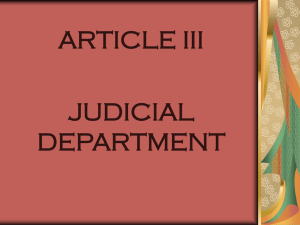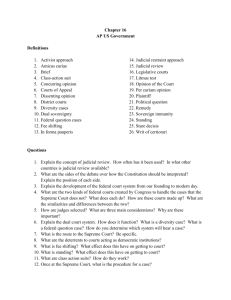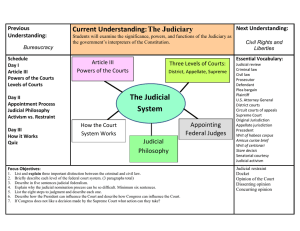No. F 32(30) FCD/2010 Government of India Ministry of Finance Department of Expenditure
advertisement

No. F 32(30) FCD/2010 Government of India Ministry of Finance Department of Expenditure Finance Commission Division Block No. XI, 5th Floor, CGO Complex, Lodhi Road, New Delhi, 20th Sept, 2010 To Secretary, Department of Justice, 26, Mansingh Road, Jaisalmer House, New Delhi 110001. Subject: Implementation of recommendation of Thirteenth Finance Commission- issue of guidelines – utilisation of grant-in-aid for Improvement in Justice Delivery recommended by Thirteenth Finance Commission. Madam, The recommendation of Thirteenth Finance Commission for the award period 2010-15 include, interalia, release of grant-in-aid to State Governments for Improvement in Justice Delivery. The first tranche of the grant has been released on the 30th June, 2010 as provided for in the report of the Thirteenth Finance Commission. This was released pending issue of guidelines on the above grant and State Government were advised to utilise the first instalment for the year 2010-11 in conformity with the recommendations of the Commission contained in paras 12.80 to 12.89 of the report of FC-XIII (Vol. I). 2. I am enclosing herewith a copy of the guidelines for release and utilization of grant-in-aid for Improvement in Justice Delivery recommended by Thirteenth Finance Commission for information. Guidelines and format of Utilisation Certificate are available on our website: http://finmin.nic.in Yours faithfully, Encl.: As above (Alok Chandra) Director (FCD) Tel: 24360647 Fax: 24360174 Email: alok.chandra@nic.in Page 1 of 13 No. F 32(30)/FCD/2010 Government of India Ministry of Finance Department of Expenditure Finance Commission Division Block No. XI, 5th Floor, CGO Complex, Lodhi Road, New Delhi, 20th Sept, 2010 To The Chief Secretary, Government of (All State Governments) Subject: Implementation of recommendation of Thirteenth Finance Commission- issue of guidelines – utilisation of grant-in-aid for Improvement in Justice Delivery recommended by Thirteenth Finance Commission. Sir, The recommendation of Thirteenth Finance Commission for the award period 2010-15 include, interalia, release of grant-in-aid to State Governments for Improvement in Justice Delivery. The first tranche of the grant has been released on the 30th June, 2010 as provided for in the report of the Thirteenth Finance Commission. This was released pending issue of guidelines on the above grant and State Government were advised to utilise the first instalment for the year 2010-11 in conformity with the recommendations of the Commission contained in paras 12.80 to 12.89 of the report of FC-XIII (Vol. I). 2. I am enclosing herewith a copy of the guidelines for release and utilization of grant-in-aid for Improvement in Justice Delivery recommended by Thirteenth Finance Commission for information. Guidelines and format of Utilisation Certificate are available on our website: http://finmin.nic.in Yours faithfully, Encl.: As above (Alok Chandra) Director (FCD) Tel: 24360647 Fax: 24360174 Email: alok.chandra@nic.in Copy with a copy of the guidelines to:Principal Secretary (Finance), Government of (All State Governments) Page 2 of 13 F. No. 32(30) FCD/2010 Ministry of Finance Department of Expenditure Finance Commission Division Guidelines for release and utilisation of Grant-in-aid for Improvement in Justice Delivery as recommended by the Thirteenth Finance Commission (FC-XIII) With the objective of improving justice delivery, FC-XIII has recommended a grant of Rs.5000 crore over its award period 2010-15. This grant is aimed at providing support to improve judicial outcomes, and is allocated through the following initiatives: i) Increasing the number of court working hours using the existing infrastructure by holding morning/evening/shift courts. ii) Enhancing support to Lok Adalats to reduce the pressure on regular courts. iii) Providing additional funds to State Legal Services Authorities to enable them to enhance legal aid to the marginalised and empower them to access justice. iv) Promoting the Alternate Dispute Resolution (ADR) mechanism to resolve part of the disputes outside the court system. v) Enhancing capacity of judicial officers and public prosecutors through training programmes. vi) Supporting creation or strengthening of a judicial academy in each state to facilitate such training and vii) Creation of the post of Court Managers in every judicial district to assist the judiciary in their administrative functions. viii) Maintenance of heritage court buildings 2. The component wise and State-wise allocations recommended by FC-XIII (Annex 12.12, page 468 of the report of FC-XIII, Vol. II) are attached as Annex - I. The FC-XIII grant for improving justice delivery is in addition to the present allocations being made by the State Governments towards the respective components. 3. Country-wide consultations have been organized by the Department of Justice with State Governments and High Courts, to focus the utilization of this grant to better achieve the objective of improving judicial outcomes. Page 3 of 13 4. Based on the aforementioned consultations, read with FC-XIII’s recommendations, each State may focus the grant amount on its identified needs through a perspective plan for the 2010-15 five year period and an action plan for each financial year. Under these plans, funds allocated for a particular component may be applied, partially or fully, to other components. However, funds may not be diverted from other components to infrastructure components such as setting up of ADR centres, maintenance of heritage court buildings and infrastructure of Judicial Academies. All such focussing of expenditure would be undertaken with the approval of the High Level Monitoring Committee (HLMC), described in paragraph 14 of these guidelines. 5. Morning/Evening /Special Magistrates Shift Courts 5.1 States may set up morning/evening/shift/weekend/mobile/special magistrate courts to try petty cases so as to clear the backlog of cases and to relieve pressure on judicial time. 5.2 States are expected to dispose 1125 lakh cases of petty offences in five years through such courts. This is a temporary measure to be implemented with a clear target for disposal of cases. Funding for such courts from FC-XIII grants is during the award period of FC-XIII, 2010-15. 5.3 These Courts may either utilize the services of regular judicial officers on payment of additional compensation or retired officers. 5.4 An illustrative list of cases that could be handled by these courts has been prepared by Department of Justice on the basis of its consultations, and may be seen at Annex-II. 6. Establishment of District Alternative Dispute Resolution (ADR) Centers and Training of Mediators 6.1 States may set up an ADR center, in terms of section 89 of the Civil Procedure Code, in each judicial district which is without an ADR center. FC-XIII has allocated Rs.600 crore for ADR centers. States may use this amount to create or upgrade physical infrastructure of ADR centers. 6.2 States may use this component of the grant for the purpose of training of Mediators/Conciliators, to train 100 judicial officers and advocates in each district over 2010-15 at an estimated cost of Rs.0.25 lakh per person. This should facilitate provision of necessary services, including generation of awareness, to litigants. 7. Lok Adalats A component of the justice delivery grant is to be used to enable States to hold about ten mega Lok Adalats per High Court per year and about five Lok Adalats for Page 4 of 13 each of the 1500 court locations per year, during 2010-15. The Lok Adalats are expected to reduce pendency of cases in courts so as to dispose 15 lakh cases each year, and 75 lakh cases during 2010-15. 8. Legal Aid 8.1 The grant component of Rs.200 crore is meant to support and strengthen the efforts of the National Legal Services Authority (NALSA) and State Legal Service Authorities (SALSAs) to provide legal services to marginalized persons during 201015. 8.2 States, through HLMCs, may set targets of decline in numbers of under-trials in the courts for monitoring of progress. 9. Training of Judicial Officers 9.1 A grant component of Rs.250 crore has been provided for training of judicial officers in the country to support and strengthen the induction and in-service training of judicial officers. The funds may be used to accelerate these capacity building efforts, under the overall supervision of the HLMC. 10. State Judicial Academies 10.1 Recognizing that the main vehicle for training judges is the State Judicial Academy, FC-XIII has noted that some state academies are well equipped but others have little infrastructure and few facilities. To enable these academies to complete the training of judges promptly through the year, Rs.15 crore has been allocated per High Court (Rs.300 crore for twenty High Courts). These funds may be used to create the physical infrastructure of the judicial academies in states where they do not exist, or for providing additional facilities in the existing academies. 10.2 The grant for the Guwahati Judicial Academy, which covers all north-eastern States will be released through the Government of Assam, for the Mumbai Judicial Academy, which covers Maharashtra and Goa, through the Government of Maharashtra, and for the Chandigarh Judicial Academy, which covers Punjab and Haryana, through the Government of Punjab. 11. Training of Public Prosecutors FC-XIII has noted that poor quality of prosecution is often a reason for delay in disposal of court cases where the Government is a party. The grant component of Page 5 of 13 Rs.150 crore is to be used for training of 2000 Public Prosecutors during 2010-15. This grant component may be used to impart training at Judicial Academies, State Administrative Institutes or other institutions such as law universities. 12. Creation of posts of Court Managers 12.1 With a view to enhancing the efficiency of court management, and resultant improvement in case disposal, Rs.300 crore have been allocated for employment of professionally qualified Court Managers to assist judges. The Court Managers, with MBA degrees, will support the judges to perform their administrative duties, thereby enabling the judges to devote more time to their judicial functions. The post of a Court Manager would be created in each judicial district to assist the Principal District and Session judges. Two posts of Court Manager may be created for each High Court, and one for each Bench of the High Court. In case the High Court is of the opinion that one Court Manager would be sufficient for more than one district, then HLMC can also take such a decision. 12.2 Suggested functions, responsibilities and qualifications of court managers, as suggested by Department of Justice in consultation with the National Judicial Academy may be seen in Annex- III. 13. Maintenance of Heritage Court Buildings Acknowledging that a number of court buildings have been declared as heritage buildings under national, state or local laws, Rs.450 crore has been allocated for restoration and conservation of 150 such buildings, in collaboration with the Archeological Survey of India (ASI)/Indian National Trust for Art and Cultural Heritage (INTACH). In doing this, preference may be accorded to larger and older buildings. The HLMC in each state would decide the order of preference for such restoration and conservation. 14. Monitoring agency at State levels 14.1 Every State shall set up a High Level Monitoring Committee (HLMC), presided over by the state’s Chief Secretary, to approve the perspective and action plans for utilization of the grants recommended by the FC-XIII and for regular monitoring of the progress made in implementation of these plans. HLMC will have, among its members, Finance Secretary, Law Secretary, Home Secretary, Secretary (PWD), DG (Prosecution), Registrar General of the concerned High Court, MemberSecretary of the State Legal Service Authority and Director of the State Judicial Academy. The HLMC shall be responsible for monitoring both the physical and financial targets, ensuring adherence to specific conditions in respect of the grant. Page 6 of 13 14.2 The HLMC shall meet on a quarterly basis during the award period of FC-XIII. Minutes of HLMC meetings shall be provided to the Department of Expenditure (Finance Commission Division) in the Ministry of Finance, and to the Department of Justice. 15. Monitoring agency at the Union Government level A Review Committee will be constituted in the Government of India, headed by Secretary, Department of Justice, to review utilisation of grants. The Committee will include a representative from the Ministry of Finance (Department of Expenditure). The Committee shall meet at least twice in a year. 16. Conditions for release of grants In line with the recommendations of FC-XIII, the following conditions will be applicable to release of this grant: i) The grant will be released in five equal annual instalments, with two tranches every year on 1 July and 1 January. ii) The annual instalment for the first year (2010-11) will be released without any insistence on a State Litigation Policy (SLP), aimed at responsible litigation, being in place. iii) All subsequent instalments will be released to a State after it puts in place a State Litigation Policy. The SLP must be put in place by a State Government before the end of a fiscal year to be eligible to draw down the instalment for the succeeding fiscal years. iv) FC-XIII has recommended that SLPs, which could be based on the NLP, include steps for : a) reviewing the existing cases and wherever necessary, withdrawing cases identified as frivolous and vexatious; b) formulating norms for defending cases as well as for filing appeals and c) setting up of Empowered Committees to eliminate unnecessary litigation. v) States are required to prepare a perspective plan for 2010-15 and an action plan for each financial year for all the components with the approval of HLMC. Copies of these plans will be made available to the Review Committee constituted as in paragraph 15 above. vi) In the States’ plans, no expenditure may be proposed or incurred on the items listed in Annex-IV. vii) Accounts will be maintained and Utilisation Certificates (UCs)/Statement of Expenditure (SOEs) will be provided in accordance with General Financial Page 7 of 13 Rules (GFR 2005) in the format in Annex-V* on half-yearly basis to the Department of Justice, Utilisation Certificates will be countersigned by the State Finance Secretary. (* Annex –V is available on our website http://finmin.nic.in) 17. The grant will be released by Ministry of Finance (Department of Expenditure) on the recommendation of the Department of Justice. A budget provision will be made in the Demand for Grants number 35 of the Ministry of Finance. State Governments may make budget provisions and incur expenditure in respect of this grant under the Major Head: 2014 – Administration of Justice, on the non-plan side. 18. Audit by the Controller and Auditor General Comptroller and Auditor General of India would undertake audit of expenditure of this grant every year. The State Government shall send a copy of the audit report of the Comptroller and Auditor General of India to the Ministry of Finance and to the Department of Justice. (Alok Chandra) Director Tel.: 011-2436 0647 Fax : 011-2436 0174 Email: alok.chandra@nic.in Dated 20-09-2010 ***** Page 8 of 13 ANNEX- I State-wise Allocations Allocation of Grants for Improving Delivery of Justice No State Number of Sanctioned Courts Number of Judicial Districts Morning/ evening Courts Lok Adalat and Legal Aid Training of Judicial Officers Training of Public Prosecu tors Heritage Court Buildings State ADR Judicial centers Academy Court Managers Total (Rs.crore) 2 Andhra Pradesh Arunachal Pradesh 3 Assam 4 Bihar 5 Chhattisgarh 6 Goa 7 Gujarat 8 1 926 339 23 0 145.18 17.42 14.52 8.71 26.13 53.15 6.38 5.31 3.19 9.57 15.00 31.25 12.50 270.71 0.00 0.00 77.60 289 21 45.31 5.44 4.53 2.72 8.16 15.00 28.53 11.41 121.10 1367 30 214.32 25.72 21.43 12.86 38.58 15.00 40.76 16.30 384.97 348 16 54.56 6.55 5.46 3.27 9.82 15.00 21.74 8.70 125.09 49 2 7.68 0.92 0.77 0.46 1.38 2.72 1.09 15.02 1028 26 161.17 19.34 16.12 9.67 29.01 35.33 14.13 299.76 393 18 61.61 7.39 6.16 3.70 11.09 24.46 9.78 124.20 126 11 19.75 2.37 1.98 1.19 3.56 15.00 14.95 5.98 64.77 10 Haryana Himachal Pradesh Jammu & Kashmir 208 22 32.61 3.91 3.26 1.96 5.87 15.00 29.89 11.96 104.46 11 Jharkhand 527 22 82.62 9.91 8.26 4.96 14.87 15.00 29.89 11.96 177.48 12 Karnataka 872 29 136.71 16.41 13.67 8.20 24.61 15.00 39.40 15.76 269.76 13 430 14 67.42 8.09 6.74 4.04 12.13 15.00 19.02 7.61 140.06 14 Kerala Madhya Pradesh 1307 49 204.91 24.59 20.49 12.29 36.88 15.00 66.58 26.63 407.38 15 Maharashtra 1898 49 297.57 35.71 29.76 17.85 53.56 15.00 66.58 26.63 542.65 16 Manipur 34 2 5.33 0.64 0.53 0.32 0.96 2.72 1.09 11.59 17 Meghalaya 10 1 1.57 0.19 0.16 0.09 0.28 1.36 0.54 4.19 18 Mizoram 40 2 6.27 0.75 0.63 0.38 1.13 2.72 1.09 12.96 19 Nagaland 27 0 4.23 0.51 0.42 0.25 0.76 0.00 0.00 6.18 20 Orissa 531 30 83.25 9.99 8.32 4.99 14.98 15.00 40.76 16.30 193.61 21 Punjab 346 14 54.25 6.51 5.42 3.25 9.76 15.00 19.02 7.61 120.83 22 Rajasthan 825 34 129.34 15.52 12.93 7.76 23.28 15.00 46.20 18.48 268.51 23 Sikkim 13 2 2.04 0.24 0.20 0.12 0.37 15.00 2.72 1.09 21.78 24 Tamil Nadu 788 30 123.54 14.83 12.35 7.41 22.24 15.00 40.76 16.30 252.44 25 80 3 12.54 1.51 1.25 0.75 2.26 4.08 1.63 24.02 26 Tripura Uttar Pradesh 2174 70 340.84 40.90 34.08 20.45 61.35 15.00 95.11 38.04 645.78 27 Uttarakhand 273 13 42.80 5.14 4.28 2.57 7.70 15.00 17.66 7.07 102.22 28 West Bengal 9 All States 15.00 698 19 109.43 13.13 10.94 6.57 19.70 15.00 25.82 10.33 210.91 15946 552 2500.00 300.00 250.00 150.00 450.00 300.00 750.00 300.00 5000.00 Page 9 of 13 ANNEX - II Illustrative list of cases assigned to morning/evening/shift/special magistrates’ courts The following is illustrative list of the cases, which have been assigned to morning/evening/special magistrate courts by various High Courts. While this list may be used for guidance by the High Courts, the High Courts and the State Governments may customize the same to suit the peculiar problems faced by the district and subordinate courts in those States. In deciding the categories of cases to be assigned to such Courts, priority should be given to those categories of cases, which contribute significantly to backlog. For example, in addition to the cases mentioned below, the States may also assign cases, which are not usually contested and are compoundable in nature to these Courts. 1. Cases pertaining to Motor Vehicles Act and ancillary regulations; 2. Cases pertaining to respective Shops and Establishments Act; 3. Cases pertaining to offences under Indian Penal Code and any other Act or rules where the punishment prescribed is non-custodial; 4. Cheque bouncing cases under Section 138 of the Negotiable Instruments Act, 1881 ; 5. Petitions for maintenance under Section 125 of the Code of Criminal Procedure, 1973; 6. Criminal revision against granting or refusing to grant interim maintenance under sub-section (3) of section 125 of the Code of Criminal Procedure, 1973 or maintenance under Section 125 of the Code of Criminal Procedure, 1973; 7. Civil cases for recovery of money under Order XXXVII of the Code of Civil Procedure, 1908, where the claim is not more than Rs. 50,000/(Rupees Fifty thousand); 8. Any other cases which may be transferred to the Morning/Evening Courts with the consent of the parties; 9. Petty offences such as: (a) Section 320 of Code of Criminal Procedure, 1973 Table I and II excluding offence under Section 324, 325, 335, 344, 357, 379, 381, 406, 407, 408, 411, 414, 418, 419, 420, 429, 430, 451 and 494 of the Indian Penal Code (b) Section 160, 279, 294 and 336 of the Indian Penal Code; and (c) all offences under any Act which are punishable with upto 2 (two) years of imprisonment. Page 10 of 13 ANNEX- III Suggested Functions, Responsibilities and Qualifications of Court Managers Policies and Standards (1) Based on applicable directives of superior courts, establish the performance standards applicable to the court (including on timeliness, efficiency; quality of court performance; infrastructure; and human resources; access to justice; as well as for systems for court management and case management). (2) Carry out an evaluation of the compliance of the court with such standards; identify deficiencies and deviations; identify steps required to achieve compliance; maintain such an evaluation on a current basis through annual updates. Planning (3) In consultation with the stakeholders of a court (including the Bar, ministerial staff, Executive Agencies supporting judicial functions such as prosecutors/police/process serving agencies and court users), prepare and update annually a 5-year court-wise Court Development Plan (CDP); (4) Monitor the implementation of the CDP and report to superior authorities on progress Information and Statistics (5) Ensure that statistics on all aspects of the functioning of the Court are compiled and reported accurately and promptly in accordance with systems established by the High Court; (6) Ensure that reports on statistics are duly completed and provided as required; Court Management (7) Ensure that the processes and procedures of the court (including for filing, scheduling, conduct of adjudication, access to information and documents and grievance redressal) are fully compliant with the policies and standards established by the High Court for court management and that they safeguard quality, ensure efficiency and timeliness, and minimize costs to litigants and to the State; and enhance access to justice. (Note: standard systems for court management should be developed at the High Court level). Case Management (8) Ensure that case management systems are fully compliant with the policies and standards established by the High Court for case management and Page 11 of 13 that they address the legitimate needs of each individual litigant in terms of quality, efficiency and timeliness, costs to litigants and to the State (Note: standard systems for case management should be developed at the High Court level). Responsiveness Management: Access to Justice; Legal Aid and User Friendliness (9) Ensure that the court meets standards established by the High Court on access to justice, legal aid and user friendliness. Quality Management (10) Ensure that the court meets quality of adjudication standards established by the High Court. Human Resource Management (11) Ensure that Human Resource Management of ministerial staff in the court comply with the Human Resource Management standards established by the High Court. Core Systems Management (12) Ensure that the core systems of the court are established and function effectively (documentation management; utilities management; infrastructure and facilities management; financial systems management (audits, accounts, payments); IT Systems Management (13) Ensure that the IT systems of the court comply with standards established by the High Court and are fully functional. (14) Feed the proposed National Arrears Grid to be set up to monitor the disposal of cases in all the courts, as and when it is set up. Qualifications Court Managers may have the following minimum qualifications: a. A degree or advanced diploma in general management; b. 5 years’ experience/training in systems and process management; c. 5 years’ experience/training in IT systems management, financial systems management; management, HR d. Excellent people skills e. Excellent communication skills. f. Excellent computer application skills. Page 12 of 13 ANNEX- IV The funds allocated by the Thirteenth Finance Commission may not be utilized towards: Acquisition of land; Creation of any permanent structure except as specifically approved by FC-XIII; Purchase of vehicles; Repair or maintenance of residential buildings; Creation of any exclusive facility for VIPs. Page 13 of 13







